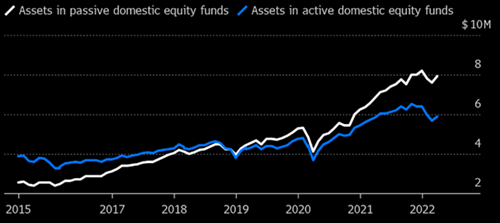

Weekly update - It pays to be active
This week’s update is penned by Charles Carpenter from our Jersey office.
The past two decades have been dominated by the rise of passive investing, such as exchange-traded funds (“ETFs”), and for good reason. ETFs seek to track a particular index, sector, commodity, or certain assets, allowing investors to gain exposure to a basket of securities with the convenience of trading as a single share.
The global ETF market is worth $5.75 trillion1, which is testament to its popularity. In addition to diversification and convenience, ETFs management and ongoing charges are often significantly cheaper than the alternative of active management. As passive strategies have become more popular capital flows into passive funds have outstripped allocation to active funds.

Source: Bloomberg (accessed 14/10/2022)
So why would one choose an actively managed fund over ETFs?
The latter use a passive strategy and track a chosen benchmark but do not seek to generate alpha. Alpha is the term used to describe when a fund generates a return that exceeds the market or benchmark. This also means that in negative market conditions, ETFs fall in line with the benchmark they are tracking as they are overexposed with limited downside protection. Therefore, an investor’s upside is limited as returns will never exceed the benchmark, but there is a degree of protection as the fund should not underperform against the benchmark.
When times get tough, investing in funds that utilise active management allows the fund manager to take advantage of both positive and negative market movements, looking to outperform the market instead of being tethered to a benchmark.
Active investment managers look to identify stocks and implement strategies that seek to outperform the specific benchmark or index, with a view to generate alpha. The additional management will lead to higher ongoing charges, but actively managed portfolios can offer greater flexibility to capital protection throughout market cycles. The ability to react to the market allows increased protection against capital losses and smooths the ups and downs of the portfolio’s performance. In addition to enhanced flexibility, active strategies can use other risk management instruments, such as put options to limit downside risk, hedge currency exposure, or increase cash positions in times of volatility.
While passive management can play a role in a well-balanced portfolio, active funds can exploit market inefficiency, by identifying pricing anomalies. Furthermore, active managers can explore niche markets and esoteric companies requiring expertise, strict due diligence, and research. A 2017 study of 126 emerging market funds by Copley Fund Research found that active managers delivered returns of 31.8 percent after fees over a ten-year period, compared to 7.7 percent for a passive alternative.
With the markets experiencing downward pressure and high levels of volatility, the MSCI PIMFA Private Investor Balanced Index which represents an active balanced strategy is down 11.56% year-to-date2; compared to the iShares Core Balanced ETF which is down 14.82% year-to-date3.
Another reason to consider active management is managers can use their expertise to allocate capital at different levels within a fund. Increasing exposure when the conviction is high, as opposed to a weighted average across specific assets in a passive fund.
When deciding where to invest it is important to take an holistic approach. Passive strategies may offer lower ongoing charges and at times better performance, but there is an increased risk in terms of diversification and managing volatility. Active strategies allow managers to manage risk, at the same time strive to provide returns in excess of the market, and investors can benefit from a skilled manager’s expertise.
We hope you all have a good week.
Sources:


